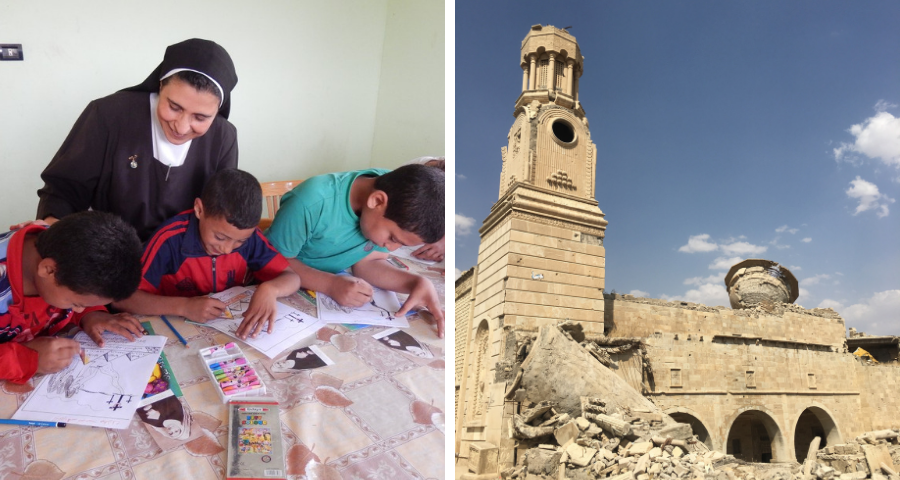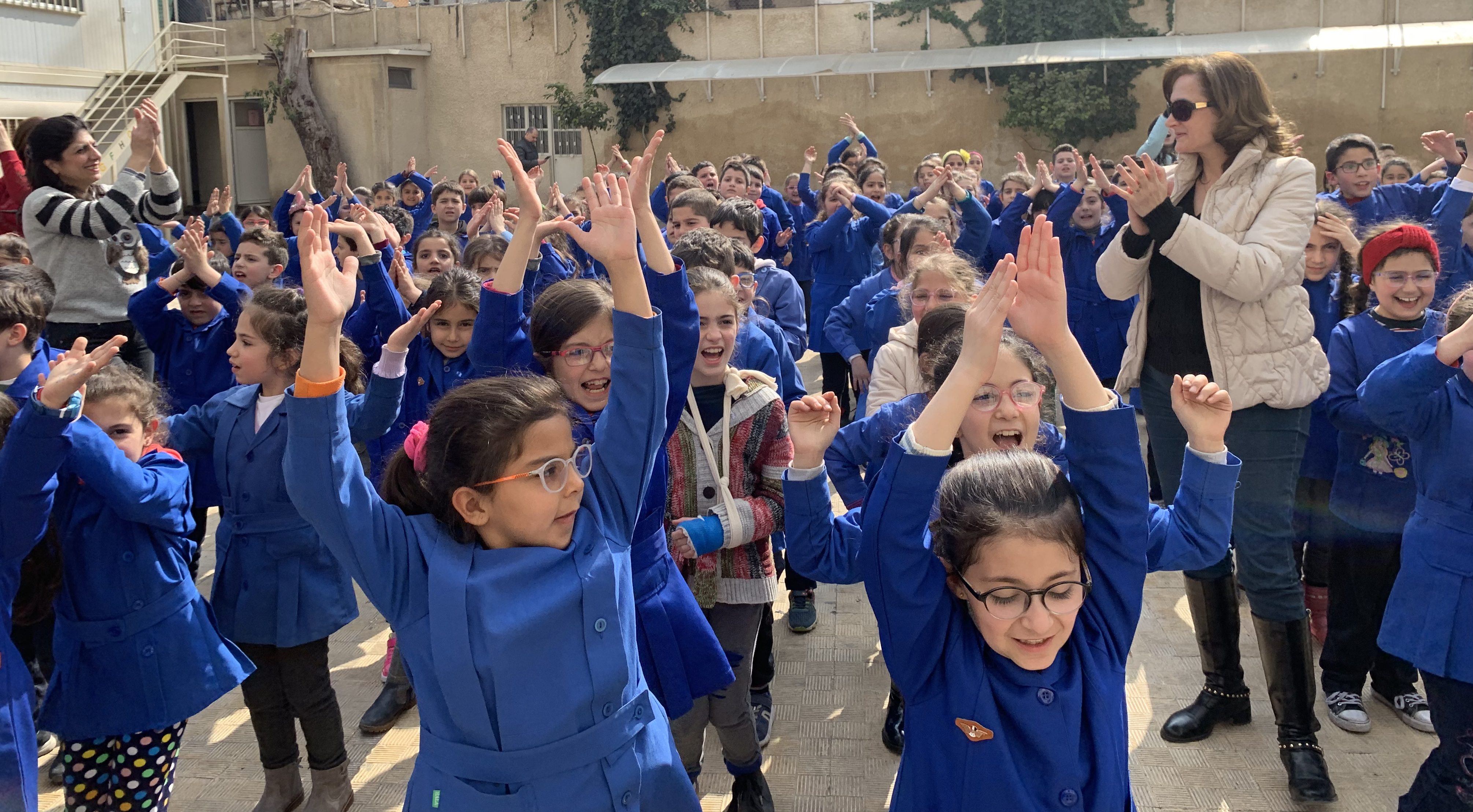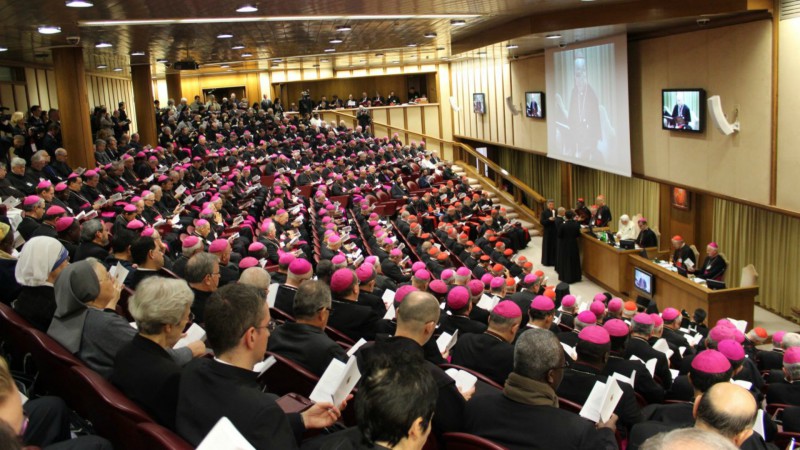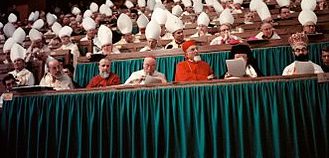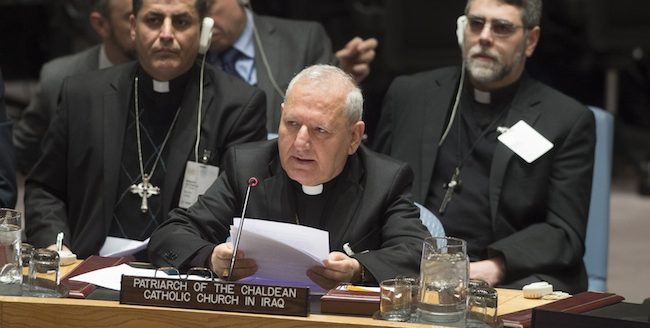DECREE ON THE CATHOLIC CHURCHES
OF THE EASTERN RITE
ORIENTALIUM ECCLESIARUM
SOLEMNLY PROMULGATED BY HIS HOLINESS
POPE PAUL VI
ON NOVEMBER 21, 1964
PREAMBLE
1. The Catholic Church holds in high esteem the institutions, liturgical rites, ecclesiastical traditions and the established standards of the Christian life of the Eastern Churches, for in them, distinguished as they are for their venerable antiquity, there remains conspicuous the tradition that has been handed down from the Apostles through the Fathers (1) and that forms part of the divinely revealed and undivided heritage of the universal Church. This Sacred Ecumenical Council, therefore, in its care for the Eastern Churches which bear living witness to this tradition, in order that they may flourish and with new apostolic vigor execute the task entrusted to them, has determined to lay down a number of principles, in addition to those which refer to the universal Church; all else is remitted to the care of the Eastern synods and of the Holy See.
THE INDIVIDUAL CHURCHES OR RITES
2. The Holy Catholic Church, which is the Mystical Body of Christ, is made up of the faithful who are organically united in the Holy Spirit by the same faith, the same sacraments and the same government and who, combining together into various groups which are held together by a hierarchy, form separate Churches or Rites. Between these there exists an admirable bond of union, such that the variety within the Church in no way harms its unity; rather it manifests it, for it is the mind of the Catholic Church that each individual Church or Rite should retain its traditions whole and entire and likewise that it should adapt its way of life to the different needs of time and place.(2)
3. These individual Churches, whether of the East or the West, although they differ somewhat among themselves in rite (to use the current phrase), that is, in liturgy, ecclesiastical discipline, and spiritual heritage, are, nevertheless, each as much as the others, entrusted to the pastoral government of the Roman Pontiff, the divinely appointed successor of St. Peter in primacy over the universal Church. They are consequently of equal dignity, so that none of them is superior to the others as regards rite and they enjoy the same rights and are under the same obligations, also in respect of preaching the Gospel to the whole world (cf. Mark 16, 15) under the guidance of the Roman Pontiff.
4. Means should be taken therefore in every part of the world for the protection and advancement of all the individual Churches and, to this end, there should be established parishes and a special hierarchy where the spiritual good of the faithful demands it. The hierarchs of the different individual Churches with jurisdiction in one and the same territory should, by taking common counsel in regular meetings, strive to promote unity of action and with common endeavor to sustain common tasks, so as better to further the good of religion and to safeguard more effectively the ordered way of life of the clergy.(3)
All clerics and those aspiring to sacred Orders should be instructed in the rites and especially in the practical norms that must be applied in interritual questions. The laity, too, should be taught as part of its catechetical education about rites and their rules.
Finally, each and every Catholic, as also the baptized of every non-Catholic church or denomination who enters into the fullness of the Catholic communion, must retain his own rite wherever he is, must cherish it and observe it to the best of his ability (4), without prejudice to the right in special cases of persons, communities or areas, to have recourse to the Apostolic See, which, as the supreme judge of interchurch relations, will, acting itself or through other authorities, meet the needs of the occasion in an ecumenical spirit, by the issuance of opportune directives, decrees or rescripts.
PRESERVATION OF THE SPIRITUAL HERITAGE OF THE EASTERN CHURCHES
5. History, tradition and abundant ecclesiastical institutions bear outstanding witness to the great merit owing to the Eastern Churches by the universal Church.(5) The Sacred Council, therefore, not only accords to this ecclesiastical and spiritual heritage the high regard which is its due and rightful praise, but also unhesitatingly looks on it as the heritage of the universal Church. For this reason it solemnly declares that the Churches of the East, as much as those of the West, have a full right and are in duty bound to rule themselves, each in accordance with its own established disciplines, since all these are praiseworthy by reason of their venerable antiquity, more harmonious with the character of their faithful and more suited to the promotion of the good of souls.
6. All members of the Eastern Rite should know and be convinced that they can and should always preserve their legitimate liturgical rite and their established way of life, and that these may not be altered except to obtain for themselves an organic improvement. All these, then, must be observed by the members of the Eastern rites themselves. Besides, they should attain to an ever greater knowledge and a more exact use of them, and, if in their regard they have fallen short owing to contingencies of times and persons, they should take steps to return to their ancestral traditions.
Those who, by reason of their office or apostolic ministries, are in frequent communication with the Eastern Churches or their faithful should be instructed according as their office demands in the knowledge and veneration of the rites, discipline, doctrine, history and character of the members of the Eastern rites.(6) To enhance the efficacy of their apostolate, Religious and associations of the Latin Rite working in Eastern countries or among Eastern faithful are earnestly counseled to found houses or even provinces of the Eastern rite, as far as this can be done.(7)
EASTERN RITE PATRIARCHS
7. The patriarchate, as an institution, has existed in the Church from the earliest times and was recognized by the first ecumenical councils.(8)
By the name Eastern patriarch, is meant the bishop to whom belongs jurisdiction over all bishops, not excepting metropolitans, clergy and people of his own territory or rite, in accordance with canon law and without prejudice to the primacy of the Roman Pontiff.(9)
Wherever a hierarch of any rite is appointed outside the territorial bounds of the patriarchate, he remains attached to the hierarchy of the patriarchate of that rite, in accordance with canon law.
8. Though some of the patriarchates of the Eastern Churches are of earlier and some of later date, nonetheless all are equal in respect of patriarchal dignity, without however prejudice to the legitimately established precedence of honor.(10)
9. By the most ancient tradition of the Church the patriarchs of the Eastern Churches are to be accorded special honor, seeing that each is set over his patriarchate as father and head.
This Sacred Council, therefore, determines that their rights and privileges should be re-established in accordance with the ancient tradition of each of the Churches and the decrees of the ecumenical councils.(11)
The rights and privileges in question are those that obtained in the time of union between East and West; though they should be adapted somewhat to modern conditions.
The patriarchs with their synods are the highest authority for all business of the patriarchate, including the right of establishing new eparchies and of nominating bishops of their rite within the territorial bounds of the patriarchate, without prejudice to the inalienable right of the Roman Pontiff to intervene in individual cases.
10. What has been said of patriarchs is valid also, in harmony with the canon law, in respect to major archbishops, who rule the whole of some individual church or rite.(12)
11. Seeing that the patriarchal office in the Eastern Church is a traditional form of government, the Sacred Ecumenical Council ardently desires that new patriarchates should be erected where there is need, to be established either by an ecumenical council or by the Roman Pontiff.(13)
THE DISCIPLINE OF THE SACRAMENTS
12. The Sacred Ecumenical Council confirms and approves the ancient discipline of the sacraments existing in the Oriental Churches, as also the ritual practices connected with their celebration and administration and ardently desires that this should be re-established if circumstances warrant it.
13. The established practice in respect of the minister of Confirmation that has obtained from most early times in the Eastern Church should be fully restored. Therefore, priests validly confer this sacrament, using chrism blessed by a patriarch or a bishop.(14)
14. All Eastern Rite priests, either in conjunction with Baptism or separately from it, can confer this sacrament validly on all the faithful of any rite including the Latin; licitly, however, only if the regulations both of the common and the particular law are observed.(15) Priests, also, of the Latin Rite, in accordance with the faculties they enjoy in respect to the administration of this sacrament, validly administer it also to the faithful of Eastern Churches; without prejudice to the rite, observing in regard to licitness the regulations both of the common and of the particular law.(16)
15. The faithful are bound to take part on Sundays and feast days in the Divine Liturgy or, according to the regulations or custom of their own rite, in the celebration of the Divine Office.(17) That the faithful may be able more easily to fulfill their obligation, it is laid down that the period of time within which the precept should be observed extends from the Vespers of the vigil to the end of the Sunday or the feast day.(18) The faithful are earnestly exhorted to receive Holy Communion on these days, and indeed more frequently-yes, even daily.(19)
16. Owing to the fact that the faithful of the different individual churches dwell intermingled with each other in the same area or Eastern territory, the faculties for hearing confessions duly and without restriction given to priests of any rite by their own hierarchs extend to the whole territory of him who grants them and also to the places and faithful of any other rite in the same territory, unless the hierarch of the place has expressly excluded this for places of his rite.(20)
17. In order that the ancient established practice of the Sacrament of Orders in the Eastern Churches may flourish again, this Sacred Council ardently desires that the office of the permanent diaconate should, where it has fallen into disuse, be restored.(21) The legislative authorities of each individual church should decide about the subdiaconate and the minor orders and the rights and obligations that attach to them.(22)
18. To obviate invalid marriages when Eastern Catholics marry baptized Eastern non-Catholics and in order to promote fidelity in and the sanctity of marriage, as well as peace within the family, the Sacred Council determines that the canonical “form” for the celebration of these marriages is of obligation only for liceity; for their validity the presence of a sacred minister is sufficient, provided that other prescriptions of law are observed.(23)
DIVINE WORSHIP
19. It belongs only to an ecumenical council or to the Apostolic See to determine, transfer or suppress feast days common to all the Eastern Churches. On the other hand, to determine, transfer or suppress the feast days of any of the individual churches is within the competence not only of the Apostolic See but also of the patriarchal or archiepiscopal synod, due regard being had to the whole area and the other individual churches.(24)
20. Until such time as all Christians are agreed on a fixed day for the celebration of Easter, with a view meantime to promoting unity among the Christians of the same area or nation, it is left to the patriarchs or supreme authorities of a place to come to an agreement by the unanimous consent and combined counsel of those affected to celebrate the feast of Easter on the same Sunday.(25)
21. Individual faithful dwelling outside the area or territory of their own rite may follow completely the established custom of the place where they live as regards the law of the sacred seasons. In families of mixed rite it is permissible to observe this law according to one and the same rite.(26)
22. Eastern clerics and Religious should celebrate in accordance with the prescriptions and traditions of their own established custom the Divine Office, which from ancient times has been held in high honor in all Eastern Churches.(27) The faithful too should follow the example of their forebears and assist devoutly as occasion allows at the Divine Office.
23. It belongs to the patriarch with his synod, or to the supreme authority of each church with the council of the hierarchs, to regulate the use of languages in the sacred liturgical functions and, after reference to the Apostolic See, of approving translations of texts into the vernacular.(28)
RELATIONS WITH THE BRETHREN OF THE SEPARATED CHURCHES
24. The Eastern Churches in communion with the Apostolic See of Rome have a special duty of promoting the unity of all Christians, especially Eastern Christians, in accordance with the principles of the decree, “About Ecumenism,” of this Sacred Council, by prayer in the first place, and by the example of their lives, by religious fidelity to the ancient Eastern traditions, by a greater knowledge of each other, by collaboration and a brotherly regard for objects and feelings.(29)
25. If any separated Eastern Christian should, under the guidance of the grace of the Holy Spirit, join himself to the unity of Catholics, no more should be required of him than what a bare profession of the Catholic faith demands. Eastern clerics, seeing that a valid priesthood is preserved among them, are permitted to exercise the Orders they possess on joining the unity of the Catholic Church, in accordance with the regulations established by the competent authority.(30)
26. Common participation in worship (communicatio in sacris) which harms the unity of the Church or involves formal acceptance of error or the danger of aberration in the faith, of scandal and indifferentism, is forbidden by divine law.(32) On the other hand, pastoral experience shows clearly that, as regards our Eastern brethren, there should be taken into consideration the different cases of individuals, where neither the unity of the Church is hurt nor are verified the dangers that must be avoided, but where the needs of the salvation of souls and their spiritual good are impelling motives. For that reason the Catholic Church has always adopted and now adopts rather a mild policy, offering to all the means of salvation and an example of charity among Christians, through participation in the sacraments and in other sacred functions and things. With this in mind, “lest because of the harshness of our judgment we be an obstacle to those seeking salvation” (31) and in order more and more to promote union with the Eastern Churches separated from us, the Sacred Council lays down the following policy.
27. Without prejudice to the principles noted earlier, Eastern Christians who are in fact separated in good faith from the Catholic Church, if they ask of their own accord and have the right dispositions, may be admitted to the sacraments of Penance, the Eucharist and the Anointing of the Sick. Further, Catholics may ask for these same sacraments from those non-Catholic ministers whose churches possess valid sacraments, as often as necessity or a genuine spiritual benefit recommends such a course and access to a Catholic priest is physically or morally impossible.(33)
28. Further, given the same principles, common participation by Catholics with their Eastern separated brethren in sacred functions, things and places is allowed for a just cause.(34)
29. This conciliatory policy with regard to communicatio in sacris (participation in things sacred) with the brethren of the separated Eastern Churches is put into the care and control of the local hierarchs, in order that, by combined counsel among themselves and, if need be, after consultation also with the hierarchs of the separated churches, they may by timely and effective regulations and norms direct the relations among Christians.
CONCLUSION
30. The Sacred Council feels great joy in the fruitful zealous collaboration of the Eastern and the Western Catholic Churches and at the same time declares: All these directives of law are laid down in view of the present situation until such time as the Catholic Church and the separated Eastern Churches come together into complete unity.
Meanwhile, however, all Christians, Eastern as well as Western, are earnestly asked to pray to God fervently and assiduously, nay, indeed daily, that, with the aid of the most holy Mother of God, all may become one. Let them pray also that the strength and the consolation of the Holy Spirit may descend copiously upon all those many Christians of whatsoever church they be who endure suffering and deprivations for their unwavering avowal of the name of Christ.
“Love one another with fraternal charity, anticipating one another with honor” (Rom.12:10).
Each and all these matters which are set forth in this decree have been favorably voted on by the Fathers of the Council. And we, by the apostolic authority given us by Christ and in union with the Fathers, approve, decree and establish them in the Holy Spirit and command that they be promulgated for the glory of God.
Given in Rome at St. Peter’s, November 21, 1964
NOTES
(1) Leo XIII, Litt. Ap. Orientalium dignitas, 30 nov. 1894, in Leonis XIII Acta, vol. XIV, pp. 201-202.
(2) S. Leo IX, Litt. In terra pax, an. 1053: Ut enim; Innocentius III, Synodus Lateranensis IV, an. 1215, cap. IV: . Licet Graccos; Litt. Inter quatuor, 2 aug. 1206: Postulasti postmodum; Innocentius IV, Ep. Cum de cetero, 27 aug. 1247; Ep. Sub catholicae, 6 mart. 1254, proem.; Nicolaus III, Instructio Istud est memoriale, 9 oct. 1278; Leo X, Litt. Ap. Accepimus nuper, 18 maii 1521; Paulus III, Litt. Ap. Dudum, 23 dec. 1534; Pius IV, Const. Romanus Pontifex, 16 febr. 1564, 5; Clemens VIII, Const. Magnus Dominus, 23 dec. 1595, 10; Paulus V, Const. Solet circumspeata, 10 dec. 1615, 3; Benedictus XIV, Ep. Enc. Demandatam, 24 dec. 1743, 3; Ep. Enc. Allatae sunt, 26 iun. 1755, 3, 6-19, 32; Pius VI, Litt. Enc. Catholicae communionis, 24 maii 1787; Pius IX, Litt. In suprema, 6 ian. 1848, 3; Litt. Ap. Ecclesiam Christ;, 26 nov. 1853; Const. Romani Pontificis, 6 ian. 1862; Leo XIII, Litt. Ap. Praeclara, 20 iun. 1894, n. 7; Litt. Ap. Orientalium dignitas, 30 nov. 1894, proem.; etc.
(3) Pius XII, Motu proprio Cleri sanctitati, 2 iun. 1957, can. 4.
(4) Pius XII, Motu proprio Cleri sanctitati, 2 iun. 1957, can. 8: sine licentia Sedis Apostolicae, sequendo praxim saeculorum praecedentium; item quoad baptizatos acatholicos in can. 11 habetur: ritum quem maluerint am plecti possunt; in textu proposito disponitur modo positivo observantia ritus pro omnibus et ubique terrarum.
(5) Cfr. Leo XIII, Litt. Ap. Orientalium dignitas, 30 nov. 1894; Ep. Ap. Praeclara gratulationis, 20 iun. 1894, et documenta in nota 2 allata.
(6) Cfr. Benedictus XV, Motu proprio Orientis catholici, 15 oct. 1917, Pius XI, Litt. Enc. Rerum orientalium, 8 sept. 1928, etc.
(7) Praxis Ecclesiae catholicae temporibus Pii XI, Pii XII, Ioannis XXIII motum hunc abunde demonstrat.
(8) Cfr. Synodum Nicaenam I, can. 6; Constantinopolitanam I, can. 2 et 3; Chalcedonensem, can. 28; can. 9; Constantinopolitanam IV can. 17; can. 21; Lateranensem IV can. 5; can. 30; Florentinam, Decr. pro. Graecis; etc.
(9) Gfr. Synodum Nicaenam I, can. 6, Constantinopolitanam I, can. 3; Constantinopolitanam IV, can. 17, Pius XII, Motu proprio Cleri sanctitati, can. 216; 2, 1 .
(10) In Synodis Oecumenicis: Nicaena I, can. 6; Constantinopolitana I, can. 3; Constantinopolitana IV, can. 21; Lateranensi IV, can. 5; Florentina, decr. pro Graecis, 6 iul. 1439, 9. Cfr. Pius XII, Motu proprio Cleri sanctitati, 2 iun. 1957, can. 219, etc.
(11) Cfr. supra, nota 8.
(12) Cfr. Synodum Ephesinam, can. 8; Clemens VII, Decet Romanum Pontificem, 23 febr. 1596; Pius VII, Litt. Ap. In universalis Ecclesiae, 22 febr. 1807; Pius XII Motu proprio Cleri sanctitati, 2 iun. 1957, can. 324-327; Syn. Carthaginen., an. 419, can. 17.
(13) Syn. Carthaginen., an. 419, can. 17 et 57; Chalcedonensis, an. 451, can. 12; S. Innocentius I, Litt. Et onus et honor, a. c. 415: Nam quid sciscitaris; S. Nicolaus I, Litt. Ad consulta vestra, 13 nov. 866: A quo autem; Innocentius III, Litt. Rex regum, 25 feb 1204; Leo XII, Const. Ap. Petrus Apostolorum Princeps, 15 aug 1824; Leo XIII, Litt. Ap. Christi Domini, an. 1895; Pius XII, Motu proprio Cleri sanctitati, 2 iun 1957, can. 159.
(14) Cfr. Innocentius IV, Ep Sub catholicae, 6 mart. 1264; 3, n. 4; Syn. Lugdunensis II, an. 1274 (professio fidei Michaelis Palaeologi Gregorio X oblata); Eugenius IV, in Syn. Florentina, Const. Exsultate Deo, 22 nov. 1439, 11; Clemens VIII, Instr. Sanctissimus, 31 aug. 1595; Benedictus XIV. Const. Etsi pastoralis, 26 maii 1742, II, n. 1, III, n. 1, etc.; Synodus Laodicena, an. 347/381, can. 48; Syn. Sisen. Armenorum, an. 1342; Synodus Libanen. Maronitarum, an. 1736, P. II, Cap. III n. 2, et aliae Synodi particulares.
(15) Cfr. S.C.S. Officii, Instr. (ad Ep. Scepusien.), an. 1783; S.C. de Prop. Fide (pro Coptis), 15 mart. 1790, n. XIII; Decr. 6 oct. 1863, C, a; S.C. pro Eccl. Orient. 1 maii 1948; S.C.S. Officii, resp. 22 apr. 1896 cum litt. 19 maii 1896.
(16) CIC, can. 782, 4; S.C. pra Eccl. Orient., Decretum . de Sacramento Confirmationis administrando etiam fidelibus orientalibus a presbyteris latini ritus, qui hoc indulto gaudeant pro fidelibus sui ritus, 1 maii 1948.
(17) Cfr. Syn. Laodicen., an. 347/381, can. 29; S. Nicephorus CP., cap. 14; Syn. Duinen. Armenorum, an. 719, can. 31; S. Theodorus Studita, sermo 21; S. Nicolaus I, Litt. Ad consulta vestra, 13 nov. 866: In quorum Apostolorum; Nos cupitis; Quod interrogatis; Praeterea consulitis; Si die Dominico; et Synodi particulares.
(18) Novum quid, saltem ubi viget obligatio audiendi S. Liturgiam; ceterum cohaeret diei liturgicae apud Orientales.
(19) Cfr. Canones Apostolorum, 8 et 9; Syn. Antiochena, an. 341, can. 2; Timotheus Alexandrinus, interrogat. 3; Innocentius III, Const. Quia divinae, 4 ian. 1215; et plurimae Synodi particulares Ecclesiarum Orientalium recentiores.
(20) Salva territorialitate iurisdictionis, canon providere intendit, in bonum animarum, pluralitati iurisdictionis in eodem territorio.
(21) Cfr. Syn. Nicaena I, can. 18; Syn. Neocaesarien., an. 314/ 325, can. 12; Syn. Sardicen., an. 343, can. 8; S. Leo M., Litt. Omnium quidem, 13 ian. 444; Syn. Chalcedonen., can. 6; Syn. Constantinopolitana IV, can. 23, 26; etc.
(22) Subdiaconatus consideratur apud Ecclesias Orientales plures Ordo minor, sed Motu proprio Pii XII, Cleri sanctitati, ei praescribuntur obligationes Ordinum maiorum. Canon proponit ut redeatur ad disciplinam antiquam singularum Ecclesiarum quoad obligationes subdiaconorum, in derogationem iuris communis Cleri sanctitati.
(23) Cfr. Pius XII, Motu proprio Crebrae allatae, 22 febr. 1949, can. 32, 2, n. 5 (facultas patriarcharum dispensandi a forma); Pius XII, Motu proprio Cleri sanctitati, 2 iun. 1957, can. 267 (facultas patriarcharum sanandi in radice); S.C.S. Offici et S.C. pro Eccl. Orient., an. 1957 concedunt facultatem dispensandi a forma et sanandi ob defectum formae (ad quinquennium): extra patriarchatus, Metropolitis, ceterisque Ordinariis locorum… qui nullum habent Superiorem infra Sanctam Sedem.
(24) Cfr. S. Leo M., Litt. Quod saepissime, 15 apr. 454: Petitionem autem; S. Nicephorus CP., cap. 13; Syn. Sergii Patriarchae 18 sept. 1596; can. 17; Pius VI Litt. Ap. Assueto paterne, 8 apr. 1775; etc.
(25) Cfr. Syn. Vaticana II Const. De Sacra Liturgia, 4 dec. 1963.
(26) Cfr. Clemens VIII, Instr. Sanctissimus, 31 aug. 1595, 6: Si ipsi graeci; S.C.S. Officii, 7 iun. 1673, ad 1 et 3; 13 mart. 1727, ad 1; S.C. de Prop. Fide, Decret. 18 aug. 1913, art. 33; Decret. 14 aug. 1914, art. 27; Decret. 27 mart. 1916, art. 14; S.C. pro Eccl. Orient., Decret. 1 mart. 1929, art. 36; Decret. 4 maii 1930 art. 41.
(27) Cfr. Syn. Laodicen., 347/381, can. 18; Syn. Mar Issaci Chaldaeorum, an. 410, can. 15; S. Nerses Glaien. Armenorum, an. 1166; Innocentius IV Ep. Sub catholicae, 6 mart. 1254, 8; Benedictus XIV, Const. Etsi pastoralis 26 maii 1742, 7, n. 5; Inst. Eo quamvis tempore, 4 maii 1745 42 ss.; et Synodi particulares recentiores:Armenorum (1911) Coptorum (1898), Maronitarurn (1736), Rumenorum (1872), Ruthenorum (1891), Syrorum (1888).
(28) Ex traditione orientali.
(29) Ex tenore Bullarum unionis singularum Ecclesiarum orientalium catholicarum.
(30) Obligatio synodalis quoad fratres seiunctos orientales et quoad omnes Ordines cuiuscumque gradus tum iuris divini tum ecclesiastici.
(31) Haec doctrina valet etiam in Ecclesiis seiunctis.
(32) S. Basilius M., Epistula canonica ad Amphilochium, PG. 32, 669 B.
(33) Fundamentum mitigationisconsideratur: 1) validitas sacramentorum; 2) bona fides et dispositio; 3) necessitas salutis aeternae; 4) absentia sacerdotis proprii; 5) exclusio periculorum vitandorum et formalis adhaesionis errori.
(34) Agitur de s. d. communicatione in sacris extrasacramentali, Concilium est quod mitigationem concedit, servatis servandis.

